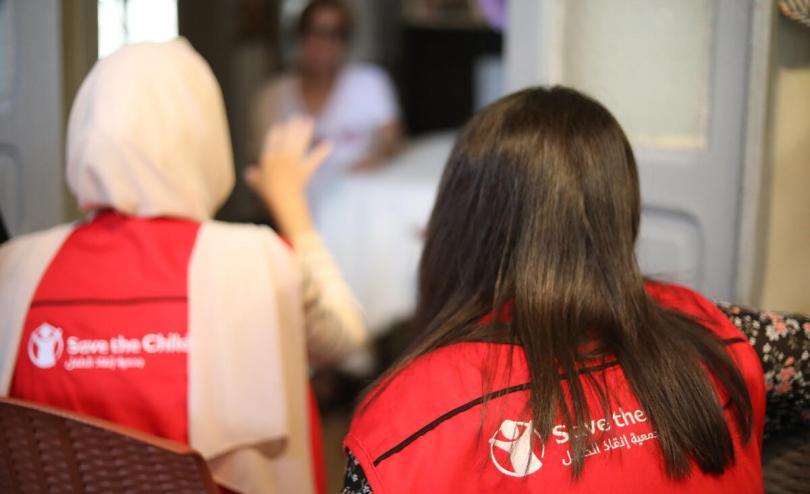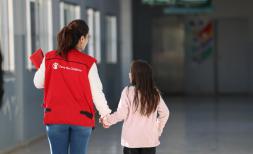LEBANON – One year after Beirut blast, economic crisis pushes families further into hunger, says Save the Children

Hundreds of thousands of children in Lebanon are going to bed hungry, Save the Children warned today, as their parents increasingly fail to make ends meet at the end of every month and are unable to pay for basics such as food, electricity and medicine.
The gap in finances needed to buy basic goods has skyrocketed 550 per cent over the past year, according to a new analysis of the financial situation of families in Beirut published a year after an explosion in the port tore through the city.
Save the Children’s analysis found that families from virtually all wealth groups in the nation’s capital have been plunged deeper into poverty, with children increasingly being sent out to work.
Very poor families are hardest hit, falling on average 5.5 million Lebanese pounds short of the 6.1 million pounds needed monthly just to afford the basics. This shortfall is equivalent to $3,600 USD at the official bank rate or $456 at the official informal rate. Poor and middle-income families are also several hundred dollars short every month.
Najwa, a Lebanese single mother of two, receives cash assistance from Save the Children. She said,
“Our children are craving food - as simple and tragic as that. My children (16 and 13 years old) lost weight significantly and the entire situation has affected not only their physical but also mental health. Both my parents are elderly with chronic illnesses. My father has cancer and, due to the situation, we missed a couple of months of treatment. Medication was either unavailable or too expensive. I don’t know how long we’ll be able to survive the situation. For months, we kept waiting and hoping things would get better but all we’re witnessing is a free fall into the abyss.”
On August 4th last year, an explosion killed over 200 people and wounded more than 7,000, destroying the port and thousands of homes and shops in Beirut. The impact of the blast, coupled with an ongoing economic crisis, COVID-19, and the highest spike in food prices in the world, means more families in Lebanon are resorting to desperate measures that affect the youngest and the most vulnerable.
These include eating less, poorer quality food, buying food on credit, and selling furniture. Many are cutting back on health and education expenses, and are surviving on savings or borrowed money, or by sending their children to do dangerous work just to survive every month, said the child rights organisation.
Salma, a Syrian resident of Beirut and mother of three, said,
“My son and husband were injured in the explosion so they needed medication and checkups. Everything is expensive, we can’t even afford yoghurt or cheese. We have to split the bread bag for two days and meat is a luxury we can’t afford. Our children know not to ask us for anything now because our answers would be ‘no’ or ‘not now.”
The economic crisis has impacted families from all socio-economic groups and nationalities, but Syrian refugees across the country are among the hardest hit. Some nine out of 10 Syrian families in Lebanon are living in extreme poverty. Essential goods like lentils, cooking oil, diapers, sanitary pads and fuel are unaffordable for around 47% of Lebanese[i], and almost 90% of Syrian refugees[ii].
“Surviving, but barely”, said Jennifer Moorehead, Save the Children’s country director in Lebanon. “Hundreds of thousands of children are going to bed hungry, often without having eaten a single meal that day. Families can’t afford the electricity to run a fridge or hot water, or the medicines they need to treat illness. The longer this situation continues, the more likely it is that children will slide into malnutrition, which ultimately could lead to death.”
In 2020, Save the Children warned that over half a million children in Beirut would struggle to survive by the end of the year. That number will most likely have risen sharply over the past year, the organisation said.
To support children going hungry in Lebanon and across the globe, Save the Children recently launched its largest-ever appeal, aiming to raise $130 million.
The economic downfall of Lebanon does not only impact the financial situation of children and their families, Save the Children said. Poverty has a deep impact on the education of children, on their health care, and their growth and mental development and wellbeing. Babies and young children who are unable to have a healthy diet are at risk of malnutrition and disease.
Children who are hungry have trouble learning or are dropping out of school altogether as they have to work to help with the family income.
Ms Moorehead continued: “The government of Lebanon and the international community need to start treating the situation in Lebanon for what it is – a full-fledged humanitarian crisis driven by an economy in total collapse. This crisis is entirely man-made, so it can also be man-unmade. If that doesn’t happen, children can die of hunger any day.”
Save the Children is calling for donors to prioritise funding for transparently distributed cash support for the most vulnerable families of all nationalities in Lebanon. The government of Lebanon should urgently set up a cash-based social safety net programme, to cover monthly basic needs for families, so they can ensure children have access to food, electricity, health care, clean water and can keep going to school.
More info on Save the Children’s largest-ever hunger appeal.
[i] WFP and World Bank, Lebanon Vulnerability and Food Security Assessment, March-April 2021. Accessed at: https://docs.wfp.org/api/documents/WFP-0000129566/download/
[ii] UNHCR, UNICEF, WFP, Vulnerability Assessment of Syrian Refugees in Lebanon—VaSyR, 2020. Available at: https://reliefweb.int/sites/reliefweb.int/files/resources/VASyR%202020.pdf
For spokespeople or more info, kindly reach out to:
- Ahmed Bayram, Ahmed.Bayram@savethechildren.org
- Rik Goverde, rik.goverde@savethechildren.org / +44 (0) 7732 602 301
- Out of hours (BST), media@savethechildren.org.uk / +44(0)7831 650409




